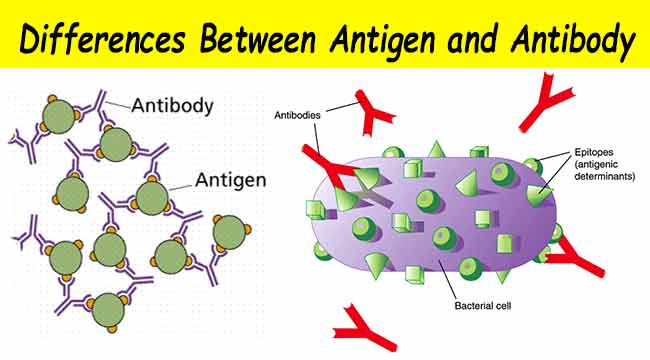What is the difference between antigen and antibody?
The human body has both natural and innate immunological responses against pathogens. The response helps to fight the buildup of pathogens in the body.
These two terms antigen and antibody tend to confuse a lot of people not only students pursuing their biological studies.
The main difference between antigen and antibody is that the former is a foreign substance that induces the immune response and the latter is a protein that detects and binds foreign substances in the body.
The lesson provides the difference between antigen and antibody in tabular form as well as point form of easier understanding.

What Is An Antigen?
An antigen is a substance that stimulates the body to produce antibodies. It is simply a foreign substance the body gets exposed to and it can cause some sicknesses.
Examples of antigens are bacteria, viruses, and fungi. They have the reputation of causing infection in the body.
What Is An Antibody?
An antibody Y-shaped protein molecules manufactured by the body to help fight foreign substances causing diseases. Antibodies are also known as immunoglobulins.
They are naturally produced by the body and they occur in almost all cells in the body to offer protection against antigens.
Comparison Chart: Antigen Vs Antibody
| Basic Terms | Antigen | Antibody |
| Meaning | Is a foreign substance that induces the immune response | Is a protein that detects and bind foreign substances in the body |
| Molecule Type | Lipids, nucleic acid, polysaccharides | Proteins |
| Origin | Formed within the body and can also be induced externally | Formed within the body only |
| Binding site | Epitope | Paratope |
| Effect | Causes disease in the body | Protect the body against foreign materials |
| Kinds | Three types as Exogenous, Endogenous and Autoantigens | Four kinds such as Immunoglobulins M, G, E, D and A |
| Prevalence | Exist in all types of cells | Exist in specific types of cells |
Core Differences between Antibody and Antigen
- Antigen triggers the immune system to release antibodies while antibodies help to bind antigens in the body.
- Antibodies are proteins in nature whereas antigens can be proteins, lipids, or carbohydrates
- Antigen causes diseases or allergic reactions whereas antibodies protect the body by immobilizing antigen materials.
- The antigen is of three kinds as Exogenous, Endogenous, and Autoantigens while antibodies are of five kinds such as Immunoglobulins M, G, E, D and A
Comparison Video
Conclusion
Examples of antigens are bacteria, viruses, and fungi while antibodies are B lymphocytes. This is the core difference between antigen and antibody. Use the comment section to share your views and suggestions.
You May Also Like
- Acute Vs Chronic Disease
- Active Transport Vs Passive Transport
- Primary Succession Vs Secondary Succession
- Inhalation Vs Exhalation
- Cellulose Vs Starch Vs Glycogen